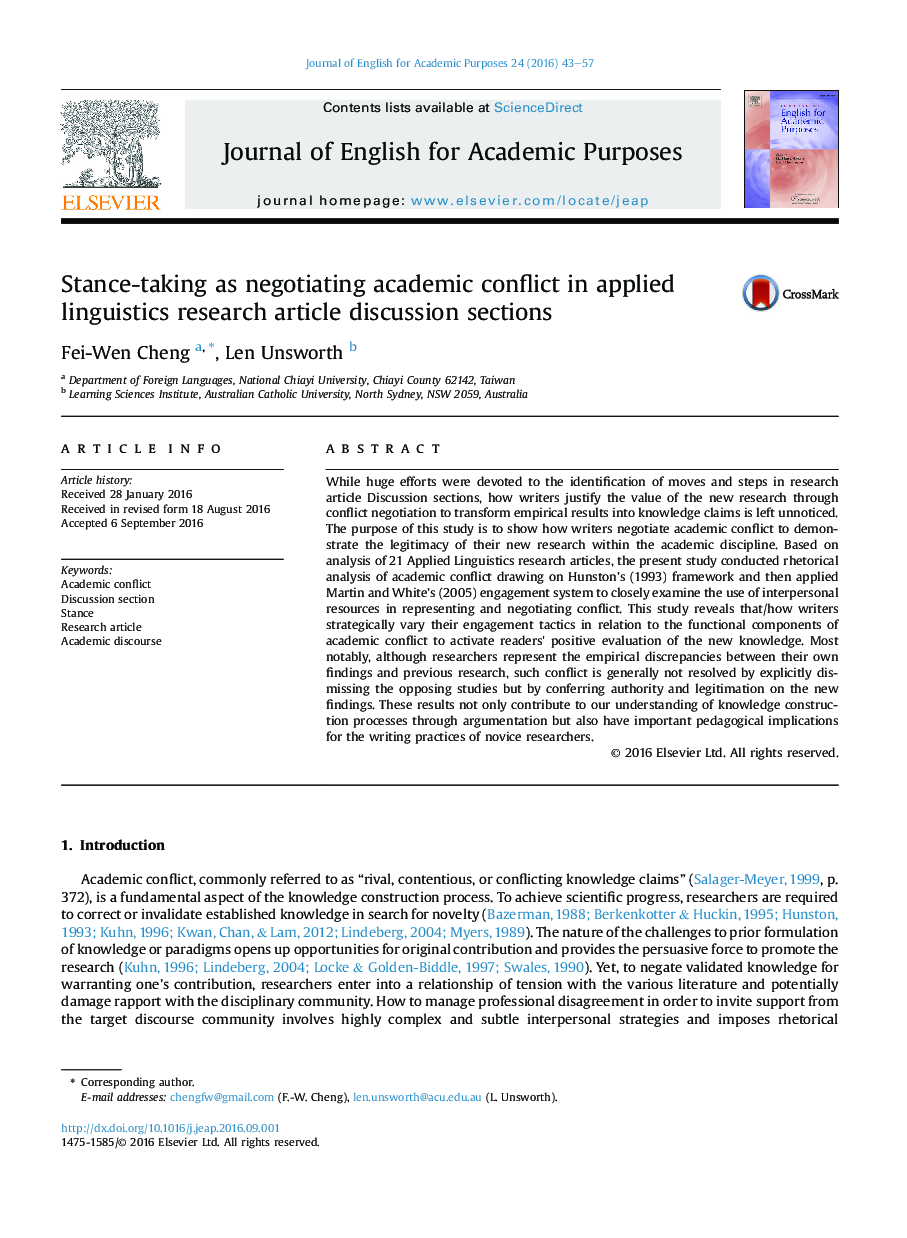| کد مقاله | کد نشریه | سال انتشار | مقاله انگلیسی | نسخه تمام متن |
|---|---|---|---|---|
| 6843138 | 620434 | 2016 | 15 صفحه PDF | دانلود رایگان |
عنوان انگلیسی مقاله ISI
Stance-taking as negotiating academic conflict in applied linguistics research article discussion sections
ترجمه فارسی عنوان
موضع گیری به عنوان درگیری در تعارض دانشگاهی در مقالات بحث مقاله پژوهشی کاربردی زبان شناسی
دانلود مقاله + سفارش ترجمه
دانلود مقاله ISI انگلیسی
رایگان برای ایرانیان
کلمات کلیدی
تعارض علمی، بخش بحث، حالت، مقاله پژوهشی، گفتمان علمی،
ترجمه چکیده
در حالی که تلاش های بزرگی برای شناسایی حرکت ها و مراحل در مقاله تحقیق اختصاص داده شده بود، بحث های بخش، چگونه نویسندگان ارزش تحقیق جدید را از طریق مذاکره درگیری برای به دست آوردن نتایج تجربی به ادعاهای دانش توجیه نشده است. هدف این مطالعه نشان دادن این است که چگونه نویسندگان درمورد تعارضات علمی مذاکره می کنند تا مشروعیت تحقیقات جدید خود را در رشته دانشگاهی نشان دهند. بر اساس تجزیه و تحلیل 21 مقاله پژوهشی کاربردی زبان شناسی، مطالعه حاضر، تحلیلی لفظی تعارض علمی را بر اساس چارچوب هنستون (1993) انجام داد و سپس سیستم تعامل مارتین و سفید (2005) را برای بررسی دقیق استفاده از منابع بین فردی در نمایندگی و مذاکره درگیری مورد استفاده قرار داد . این مطالعه نشان می دهد که چگونه نویسندگان به طور استراتژیک تاکتیک های تعامل خود را در ارتباط با اجزای عملکردی تعارض دانشگاهی برای فعال کردن ارزش گذاری مثبت خوانندگان از دانش جدید، متفاوت می کنند. مهمتر از همه، هرچند محققان، اختلاف تجربی بین یافته های خود و تحقیقات قبلی را نشان می دهند، چنین تعارضی به طور کلی حل و فصل نمی شود و به صراحت رد مطالعات مخالف، بلکه با اختیار و مشروعیت بر یافته های جدید است. این نتایج نه تنها به درک ما از فرایندهای ساخت و ساز دانش از طریق استدلال کمک می کند، بلکه دارای پیامدهای مهم آموزشی برای کارهای نوشتاری محققان تازه کار است.
موضوعات مرتبط
علوم انسانی و اجتماعی
علوم انسانی و هنر
زبان و زبان شناسی
چکیده انگلیسی
While huge efforts were devoted to the identification of moves and steps in research article Discussion sections, how writers justify the value of the new research through conflict negotiation to transform empirical results into knowledge claims is left unnoticed. The purpose of this study is to show how writers negotiate academic conflict to demonstrate the legitimacy of their new research within the academic discipline. Based on analysis of 21 Applied Linguistics research articles, the present study conducted rhetorical analysis of academic conflict drawing on Hunston's (1993) framework and then applied Martin and White's (2005) engagement system to closely examine the use of interpersonal resources in representing and negotiating conflict. This study reveals that/how writers strategically vary their engagement tactics in relation to the functional components of academic conflict to activate readers' positive evaluation of the new knowledge. Most notably, although researchers represent the empirical discrepancies between their own findings and previous research, such conflict is generally not resolved by explicitly dismissing the opposing studies but by conferring authority and legitimation on the new findings. These results not only contribute to our understanding of knowledge construction processes through argumentation but also have important pedagogical implications for the writing practices of novice researchers.
ناشر
Database: Elsevier - ScienceDirect (ساینس دایرکت)
Journal: Journal of English for Academic Purposes - Volume 24, December 2016, Pages 43-57
Journal: Journal of English for Academic Purposes - Volume 24, December 2016, Pages 43-57
نویسندگان
Fei-Wen Cheng, Len Unsworth,
